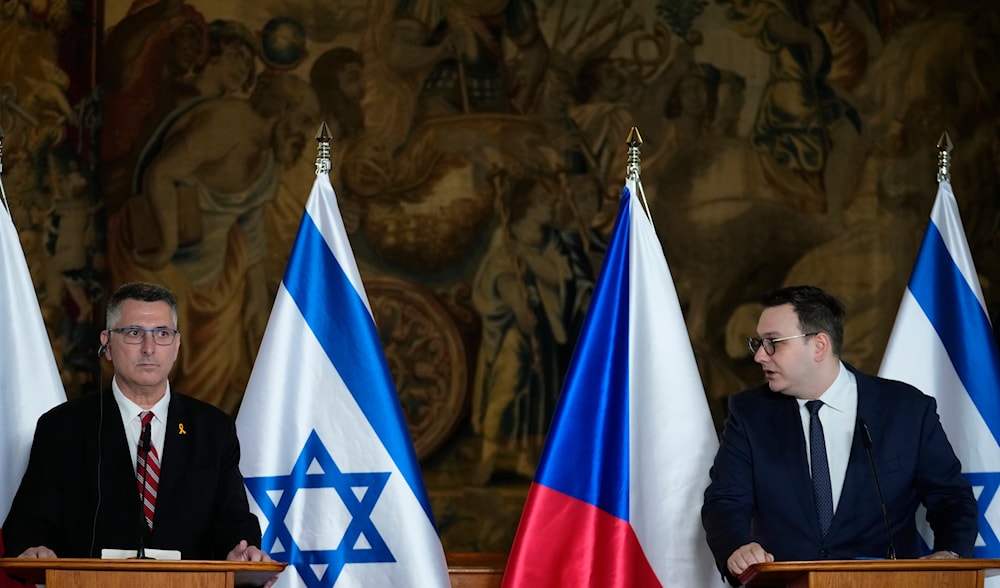Czech humanitarian organizations urge gov. to condemn Gaza violations
Czech humanitarian groups call on the government to condemn Israeli war crimes in Gaza.
-

Czech Republic's Foreign Minister Jan Lipavsky and his Israeli counterpart Gideon Saar address the media during a press conference in Prague, Czech Republic, Thursday, Nov. 28, 2024 (AP)
Three of the Czech Republic’s leading humanitarian organizations have issued a joint appeal urging the government to "unequivocally condemn" violations of international humanitarian law in Gaza and to oppose any plans for the forced resettlement of the Palestinian population.
The Czech Red Cross, People in Need, and Doctors Without Borders jointly addressed Czech Prime Minister Petr Fiala, warning that the humanitarian situation in Gaza is "critical" and requires "urgent action". The statement cited recurrent evidence of indiscriminate attacks on civilians, children dying of hunger, and the systematic erosion of international humanitarian norms.
According to UN data referenced in the statement, since October 2023, more than 1,580 healthcare workers, over 495 aid workers, and 229 journalists have been killed in Israeli airstrikes in Gaza. The NGOs emphasized that 87.3% of Gaza’s territory, comparable in size to Prague, remains under active military operations or evacuation orders.
Healthcare in the time of genocide. Inside "Israel's" systematic assault on #Gaza's health workers and facilities in numbers. pic.twitter.com/m9XyG7yprT
— Al Mayadeen English (@MayadeenEnglish) May 7, 2025
"The position of the Czech government, which avoids naming the causes of the suffering described above, is unacceptable and incompatible with its declared values," the statement read. The organizations called on the Czech government to uphold its legal and moral obligations by condemning violations of key humanitarian principles, including the principles of distinction, proportionality, and precaution.
NGOs call for adherence to international law
In their appeal, the three humanitarian organizations emphasized that Czech foreign policy must reflect international legal standards, not just economic or strategic alliances. They urged the government to use diplomatic tools to press for the release of hostages, a lasting ceasefire, and protection for civilians on all sides.
"Neutral humanitarian principles are not negotiable," the NGOs warned, adding that Czech silence risks legitimizing crimes committed during the war. They reiterated their demand for the government to denounce all violations of international humanitarian law, including any efforts to forcibly displace Palestinians from Gaza to third countries.
Czech Republic’s pro-'Israel' foreign policy
Since the start of the war on Gaza in October 2023, the Czech government has adopted one of the most pro-“Israel” stances in the European Union. Prime Minister Fiala declared the Czech Republic would be "the voice of Israel in Europe," reaffirming his government's solidarity with the occupation. Foreign Minister Jan Lipavský has defended "Israel's right to self-defense" while limiting criticism of its military actions.
The Czech Republic has consistently voted against UN resolutions calling for ceasefires in Gaza and has even blocked EU initiatives to sanction violent settlers or express concern for Palestinian civilians. Defense Minister Jana Černochová went so far as to suggest the country should leave the UN over ceasefire votes.
Public opinion and civil society pushback
Despite the country's official stance, public opinion in the Czech Republic is more nuanced. A 2024 poll by the Centre for Public Opinion Research (CVVM) found that while 37% of Czechs agree with the country’s long-term support for "Israel", 22% believe it is too strong. Only 34% supported "Israel’s" military campaign in Gaza, with 37% finding it inappropriate. Notably, 40% of respondents blamed both parties equally, reflecting public ambivalence.
This growing divide is visible in civil society. In January 2024, over 1,000 people marched through Prague calling for a ceasefire. Protests continued through July, including the occupation of the EU Commission office by pro-Palestine demonstrators.
Academics and human rights officials have also spoken out. Klára Šimáčková Laurenčíková, the Czech Government Human Rights Commissioner, described "Israel’s" actions as "crimes against humanity" and called for intensified international pressure.

 4 Min Read
4 Min Read










